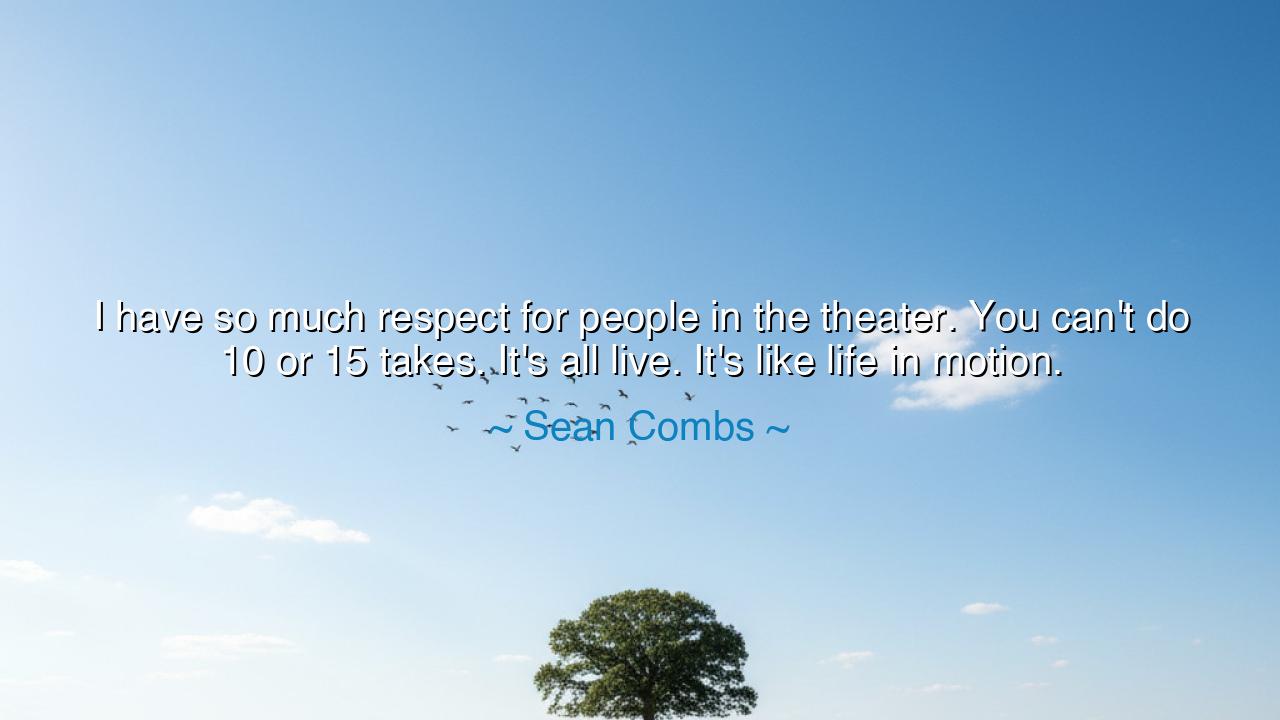
I have so much respect for people in the theater. You can't do 10
I have so much respect for people in the theater. You can't do 10 or 15 takes. It's all live. It's like life in motion.






The words of Sean Combs—“I have so much respect for people in the theater. You can't do 10 or 15 takes. It's all live. It's like life in motion”—speak with the reverence of one artist honoring another craft. Beneath his admiration lies a timeless truth about authenticity, courage, and presence. In a world where perfection can be endlessly edited and rehearsed, theater remains a sacred art of immediacy. It demands that the performer stand naked before time itself—without pause, without retake, without escape. What Combs reveals here is not only respect for the stage, but recognition of a deeper spiritual law: that life, like theater, is a performance that allows no rewinds, and therefore must be lived fully, bravely, and in the moment.
To understand the depth of this truth, one must first see what theater represents. In the theater, every performance is a living creation, born and dying in the same breath. There is no film crew to fix mistakes, no camera to retouch imperfections. Each gesture, each word, each silence is both fragile and eternal. The actor must summon not only skill, but presence—the rare ability to exist entirely within a fleeting instant. When Combs says it is “like life in motion,” he honors this sacred art for embodying what many forget: that the beauty of existence lies not in control, but in unrepeatable moments. Theater mirrors the human condition because it, too, unfolds only once.
The ancients knew this truth long before the stage was built from wood or stone. In the amphitheaters of Greece, actors performed before the gods and their fellow citizens, knowing that one slip, one missed line, could change the heartbeat of the crowd. Yet from this fragility came greatness. The philosopher Aristotle, reflecting on the tragedy of the stage, saw in it the reflection of life itself—how human beings, through suffering and courage, find meaning. To live, he believed, was to perform before the unseen eyes of destiny. Theater, then, is not mere entertainment; it is a rehearsal for life itself.
Consider the story of Sarah Bernhardt, the legendary actress of the nineteenth century. Known as “The Divine Sarah,” she performed Hamlet, Cleopatra, and countless roles with a ferocity that shook audiences to their core. She acted through pain, through scandal, even through amputation—refusing to retire after losing a leg. On stage, she was immortal; offstage, she was mortal like us all. Yet every night, she proved that the essence of greatness lies not in perfection, but in fearless presence. She never asked for a retake; she lived in every second. Her life embodied the truth Combs recognizes—that theater, like existence, offers no do-over, only the sacred urgency of now.
When Combs, a man of music and motion, pays respect to theater, he acknowledges the discipline of authenticity. In film and music, there is room for adjustment—one can hide flaws behind technology, smooth the roughness of reality. But the stage permits no such illusion. It is truth laid bare. The actor who falters must rise in the same breath; the mistake becomes part of the story. So it is with life: our missteps, our stumbles, our imperfect lines—these are not errors to erase, but threads that give meaning to the tapestry. To live fully, one must embrace the same courage as the actor on stage—to show up, to give everything, to continue, even when the spotlight blinds.
There is also humility in Combs’s words. As a man of fame and power, he looks upon the craft of others and bows his head in respect. In doing so, he teaches a higher virtue: to honor what one cannot master, to admire those who labor under conditions harsher than one’s own. This humility is the mark of wisdom. It is the recognition that all forms of excellence—be it music, theater, or life—demand the same foundation: commitment, resilience, and truth. The artist who thrives without retakes, who stands unguarded before the audience, reveals to us what it means to live without fear of failure.
The lesson of Sean Combs’s quote reaches far beyond the stage. It speaks to every soul who seeks meaning in a world obsessed with perfection. Do not wait for a second take. Do not live rehearsing your lines while the curtain of life is already open. Like the actor, you must trust your preparation, speak your truth, and embrace the unknown with grace. If you falter, recover; if you fail, transform that failure into beauty. For life, like theater, is fleeting—and that fleetingness is what gives it divine weight.
So, my child, remember this when you step into the stage of your own days: life is live. It does not pause for your hesitation, nor rewind for your regret. You must perform with heart, courage, and presence, knowing that every breath, every act of love, every mistake is part of your one great performance. Honor those who live this truth before our eyes—the actors, the artists, the teachers, the parents—for they remind us of what it means to live boldly, unedited, and alive. And when your final curtain falls, may it be said of you, as of the greatest performers: that you gave your all, and left nothing unsaid upon the stage of time.






AAdministratorAdministrator
Welcome, honored guests. Please leave a comment, we will respond soon